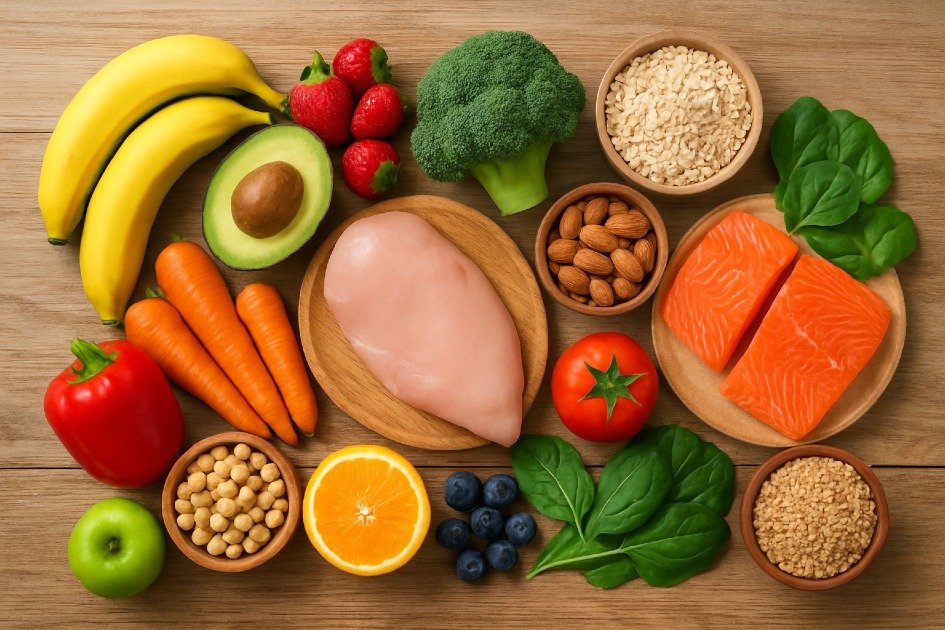Have you ever wondered why some people seem to radiate energy, maintain steady focus, and recover faster—while others constantly battle fatigue, mood swings, or sluggish digestion? The difference often comes down to one teachable yet transformative method: balanced nutrition.
Balanced nutrition involves a holistic approach that enhances bodily function, cognitive sharpness, and long-term health. This article discusses the importance of balanced nutrition for enhancing physical and mental performance.
According to Harvard Health, balanced nutrition means eating a mix of healthy foods—lots of fruits and vegetables, enough protein, good fats, and little sugar or salt—so your body stays strong and works its best.
Balanced nutrition advocates sustainable practices such as mindful eating and portion control to promote enduring habits rather than short-term diets.
This article links diet to lifestyle, encouraging intelligent fueling, intentional planning, effective movement, and purposeful eating. This holistic approach transforms each meal into an opportunity to nourish the body, strengthen the mind, and support lifelong well-being.
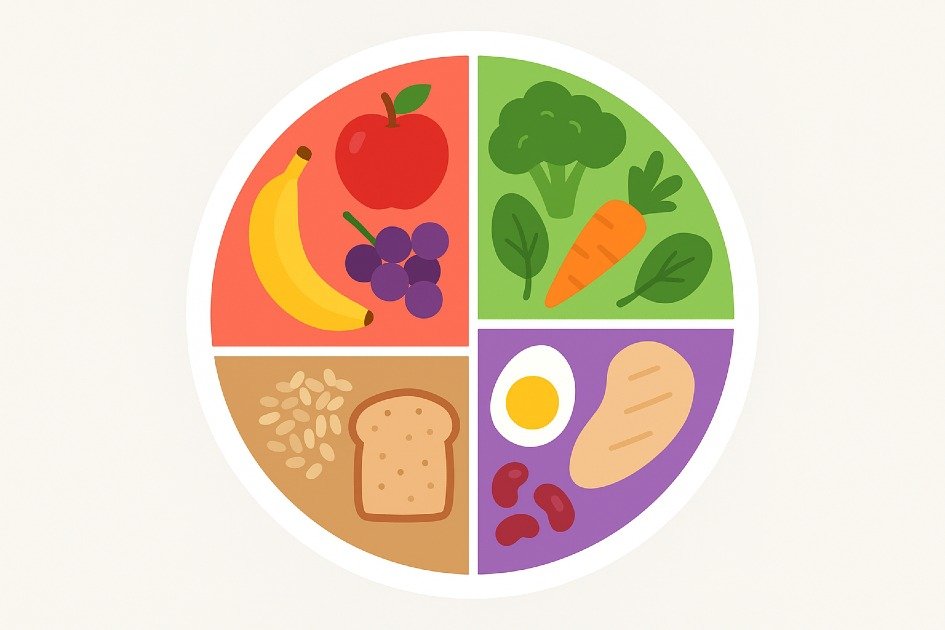
Master the Basics of Healthy Eating
Balanced nutrition is essential for lifelong health and vitality, as it supports fitness routines and lifestyle habits.
Understanding what constitutes balanced nutrition and its importance can help individuals implement practical and achievable strategies for improvement.
What Balanced Nutrition Really Means
Why it matters:
Balanced nutrition involves more than just calorie counting; it focuses on supplying the body with the appropriate nutrients in proper ratios for optimal functioning.
How to Improve:
- Choose foods rich in vitamins and minerals, not just low in calories.
- Eat a mix of whole foods like fruits, vegetables, lean proteins, whole grains, and healthy fats.
- Skip extreme diets or strict meal plans.
- Focus on your eating habits over time, not just one meal.
Your Body Needs These Vital Nutrients to Thrive
Why it matters:
Your body needs essential nutrients for proper functioning, impacting muscle contraction and brain signaling. Deficiencies may lead to fatigue, slow recovery, or cognitive difficulties.
Key Nutrients to Prioritize:
- Proteins – Protein such as chicken, fish, and beans helps your body build and fix muscles while keeping your hormones balanced.
- Carbohydrates – Carbs such as oats, quinoa, and sweet potatoes give your body energy, especially for your brain and muscles.
- Fats – Healthy fats such as avocado, olive oil, and nuts help your body make hormones and keep your brain sharp.
- Vitamins & Minerals – Support your metabolism, immune system, and bone strength with foods like leafy greens, berries, dairy, and seeds.
- Fiber – It helps digestion and keeps blood sugar steady. Found in beans, whole grains, and fruits.
How to Improve:
- Aim to have a mix of all macronutrients in every meal — protein, healthy fats, and carbohydrates.
- Eat a mix of colorful fruits and veggies each week to get a wide range of vitamins and minerals your body needs.
- Take a daily multivitamin if your diet limits certain foods.
- Plan your meals in advance to get the nutrients your body needs every day.
How Hydration Plays a Role in Overall Nutrition
Why it matters:
Water is essential for nutrition, as dehydration can mimic hunger and negatively affect metabolism, workout performance, and nutrient absorption.
How to Improve:
- Drink 8–10 glasses of water daily, more if you exercise or it is hot outside.
- Drink a glass of water before meals to help your stomach digest food better.
- Eat water-rich foods like cucumbers, melons, and oranges to stay hydrated and boost health.
- Cut sugary drinks, they make you thirsty and rob your body of water.
- Carry a reusable water bottle to stay hydrated.
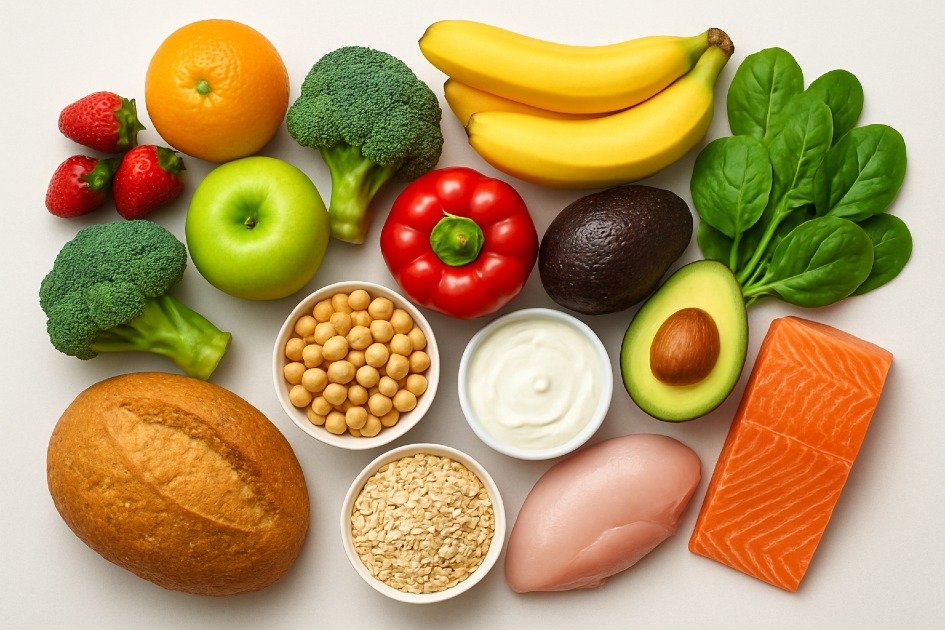
Building Blocks of a Balanced Diet
A strong, healthy body relies on understanding a balanced diet’s nutrients, which makes achieving and sustaining optimal health feasible.
Proteins Power Your Body’s Growth and Repair
Why it matters:
Proteins are essential for muscle repair, immune function, and energy management. A deficiency in protein can hinder strength maintenance, workout recovery, and vital organ function support.
How to do it:
- Add lean proteins like chicken, turkey, or fish
- Include plant proteins like lentils, chickpeas, and quinoa
- Top your salads or yogurt with nuts and seeds for a protein boost.
- Take a protein supplement if you do not get enough from food.
Sarah, 35, boosted her energy and cut afternoon cravings by starting her day with a protein smoothie.
Carbohydrates Power Your Body’s Energy System
Why it matters:
Carbohydrates are crucial for energy, brain function, and mood regulation. Selecting the appropriate carbs supports bodily functions without causing weight gain.
How to do it:
- Choose complex carbs such as brown rice, oats, sweet potatoes, and whole grain
- Cut refined sugars and processed carbs to keep blood sugar steady.
- Combine carbs with protein or healthy fats to keep your energy steady.
- Try seasonal fruits for natural, nutrient-packed carbs.
John, a busy office worker, swapped white bread sandwiches for quinoa bowls and felt more energetic in the afternoons.
Healthy Fats Keep Your Body Strong
Why it matters:
Healthy fats are essential for brain function, hormone production, and nutrient absorption; eliminating them can negatively impact health and energy levels.
How to do it:
- Add avocados, olive oil, and fatty fish to your meals.
- Try nuts and seeds for snacks instead of processed chips.
- Skip trans fats and eat less saturated fat from processed foods
- Cook with healthy oils like extra virgin olive oil or coconut oil.
I start my day with avocado toast, and it keeps me energized even on my busiest mornings.
Vitamins and Minerals Boost Your Body Power
Why it matters:
Micronutrients, although small, are essential for immunity, metabolism, and cellular health, with deficiencies potentially leading to fatigue, poor digestion, and weakened immunity.
How to do it:
- Include colorful fruits and vegetables every day to get a mix of nutrients.
- Choose fortified foods like cereals or plant-based milk to boost your daily nutrients.
- Check your blood for nutrient gaps and talk to a doctor for guidance.
- Take a high-quality multivitamin if your meals do not give you all the nutrients you need.
Lisa boosted her energy by adding spinach, bell peppers, and berries to her smoothies, feeling more vibrant in just weeks.
Fiber Fuels a Healthy Gut
Why it matters:
Fiber is essential for digestive health, weight management, and chronic disease prevention. Many adults do not consume sufficient fiber, resulting in issues such as bloating, constipation, and low energy levels.
How to do it:
- Choose whole grains such as oats, barley, and brown rice.
- Add beans, lentils, or legumes to soups, salads, and side dishes.
- Keep the skin on fruits and veggies to get the most fiber and nutrients.
- Try adding chia or flaxseeds to your smoothies or yogurt.
Mark swapped white pasta for lentil pasta and felt fuller longer with easier digestion.
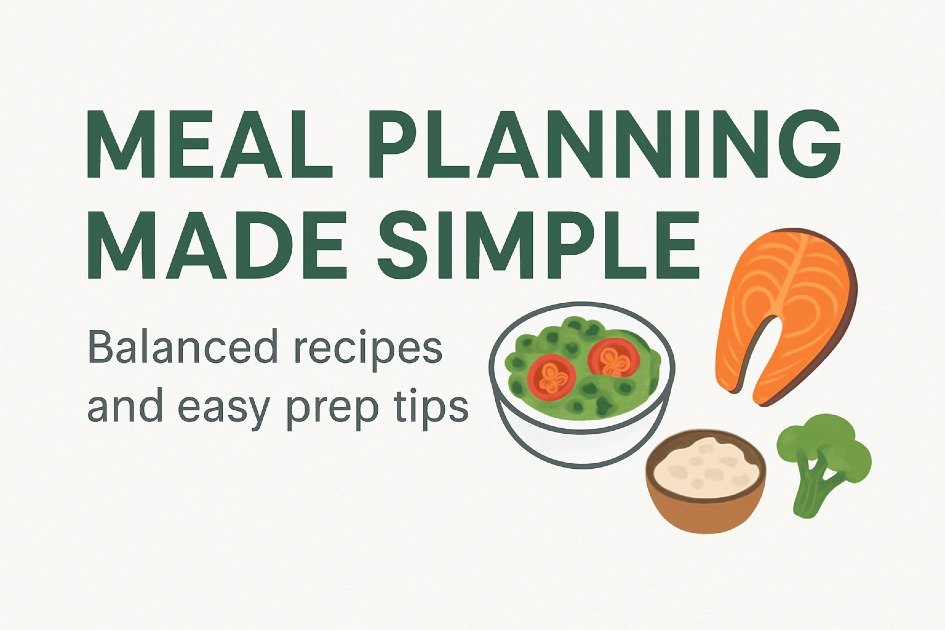
Meal Planning Made Simple
Meal planning can be simple and enjoyable, making nutrition effortless and sustainable. It saves time, reduces stress, and ensures adequate nutrient intake.
How to Create a Balanced Plate Every Time
Why it matters:
A balanced plate provides the necessary proportions of proteins, carbohydrates, fats, and micronutrients, helping to prevent sluggishness, overeating, and nutrient deficiencies.
How to do it:
- Make half your plate fruits and vegetables, one-quarter lean protein, and one-quarter whole grains.
- Add avocado, nuts, seeds, or a drizzle of olive oil to meals.
- Eating a rainbow of food gives your body more nutrients to stay healthy.
- Use a food scale or measuring cups to keep portions right.
I start with a salmon fillet, add a cup of roasted broccoli, half a cup of quinoa, and a splash of olive oil. This simple meal gives me protein, fiber, and healthy fats.
Structuring Meals for Energy
Why it Matters:
Skipping meals or eating irregularly can disrupt energy levels and contribute to overeating. A structured meal plan helps maintain a steady metabolism and prevent unhealthy cravings.
How to do it:
- Start your day with protein, complex carbs, and healthy fats—like Greek yogurt topped with berries and chia seeds.
- Eat lean protein and fiber for a productive afternoon, like chicken salad with quinoa and colorful veggies.
- Have a light, nutrient-rich dinner to help you sleep well, such as grilled fish, steamed veggies, and sweet potato.
- Keep healthy snacks ready to skip processed foods, like carrot sticks with hummus or a protein bar.
Sarah, a busy teacher, started making overnight oats with fruit for breakfast and chopping vegetables for snacks. After a month, she felt more energetic and had fewer afternoon sugar cravings.
Portion Control Without Feeling Deprived
Why it matters:
Overeating, even healthy foods, can hinder weight goals and impact digestion. Portion control helps the body learn when to stop eating while allowing for meal enjoyment.
How to do it:
- Try using smaller plates and bowls to naturally eat less and prevent overeating.
- Practice mindful eating by slowing down, chewing your food well, and paying attention to your body’s hunger signals.
- Pre-portion your snacks by placing nuts, chips, or trail mix into small containers to control portions and avoid overeating.
- Use apps to track your meals sometimes so you can learn the right portion sizes.
I pour my popcorn into a bowl during movie nights. It stops me from eating too much and keeps my snacks balanced.
Meal Prep for Busy Lifestyles
Why it matters:
Preparation is key to avoiding poor food choices when hungry and time constrained. Ready-to-eat meals provide consistent nutrition and minimize dependence on fast food.
How to do it:
- Cook several vegetables or a big batch of grains at once each week to save time and eat healthily.
- Cook chicken on the grill, bake fish, or make a big batch of tofu for easy meals.
- Store food in air-tight containers and label each meal for quick, easy access.
- Create a weekly meal calendar listing breakfast, lunch, dinner, and snacks to make healthy choices easier and save time.
- Save time and eat healthily by choosing pre-washed greens, frozen fruits, or ready-to-cook grains.
John, a busy entrepreneur, cooks every Sunday evening. He chops vegetables and grills proteins for five days of lunches. By Wednesday, he skips fast food because his meals are ready.
Making Nutrition Enjoyable and Sustainable
Why it matters:
Enjoyable meals are essential for maintaining nutrition and fostering long-term healthy habits.
How to Do It:
- Try new herbs, spices, and cooking styles to make meals more exciting and tastier.
- Try theme nights by having Monday as Mediterranean and Friday as plant-based to keep meals fun and healthy.
- Cook with family or friends to make meals more fun and stay motivated.
- Celebrate milestones with fun activities instead of giving extra treats.
Maria began making “Taco Tuesday” with whole-grain tortillas, beans, and fresh vegetables. Her family enjoyed the meals, and she started looking forward to healthy dinners every week.
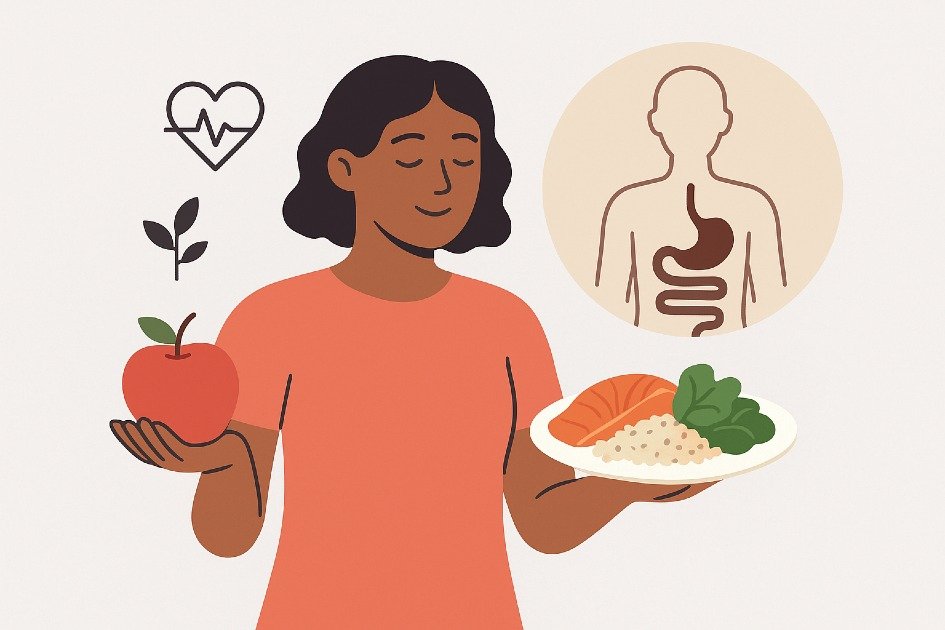
Understanding Your Body’s Unique Needs
Every individual has unique nutritional needs; a personalized approach is essential for optimal energy, strength, and health.
Understanding one’s own physiology, lifestyle, and goals enables the making of informed and sustainable dietary choices.
Nutrition Needs Change with Every Stage of Life
Why it matters:
Different life stages—children, teenagers, adults, and seniors—require specific nutrients in varying quantities.
Older adults typically need increased calcium and vitamin D for bone health, whereas younger adults require more protein and iron for growth and activity.
Neglecting these nutritional changes can result in fatigue, weakened immunity, or chronic health problems.
How to do it:
- Pay attention to calcium, vitamin D, protein, and iron to meet the needs of your age.
- Eat the right portions for your age. Kids need bigger servings to grow, while adults do better with smaller, nutrient-packed meals.
- Include age-friendly meals with leafy greens, lean proteins, whole grains, and dairy or fortified alternatives for balanced nutrition.
- Older adults can boost bone health by taking calcium and vitamin D supplements.
Maria, 62, boosted her bone health by drinking fortified almond milk and a calcium-rich smoothie, keeping her nutrition balanced and strong.
How Adults Need Different Nutrition
Why It matters:
Adults have different metabolic and hormonal nutritional needs; women require more iron because of menstruation, while men need more protein for muscle maintenance.
Customizing nutrition based on gender can prevent deficiencies, enhance energy, and promote long-term health.
How to do it:
- Women should eat lentils, spinach, and lean meats to get enough iron. Men benefit from lean proteins and healthy fats for strong energy and overall health.
- Eat phytoestrogen foods like soy and flax to help women balance hormones and add zinc-rich foods like pumpkin seeds to support men’s hormone health.
- Men need more calories because they usually have more muscle.
- Check your blood regularly to make sure your body has the right nutrients for your health.
Jake, 35, boosted his energy and recovered faster after eating more protein and zinc-rich foods.
Fuel Your Life with the Right Energy
Why it matters:
Your daily activity influences your energy expenditure, nutrient needs, and hydration.
Sedentary individuals require different nutrition compared to athletes or active professionals.
Inadequate nutrition may result in energy crashes, decreased performance, or weight gain.
How to do it:
- Active people need extra protein and complex carbs to fuel their energy and help muscles recover.
- Drink water before, during, and after exercise and add electrolytes for long workouts.
- Eat protein and carbs 1–2 hours before activity and enjoy a balanced meal after to fuel and recover your body.
- Try nutrient-dense snacks like nuts, Greek yogurt, or smoothies to boost energy without adding empty calories.
Sophie, a marathon runner, boosted her stamina by matching her meals to her training, choosing slow-digesting carbs and lean protein.
Managing Food Allergies and Personal Choices
Why it matters:
Food sensitivities, allergies, and dietary preferences can affect nutrient intake, leading to deficiencies or digestive problems. Recognizing these limitations is crucial for achieving balanced and safe nutrition.
How to do it:
- Keep a food diary and note how each meal makes you feel to spot which foods trigger reactions.
- Try nutrient-rich swaps such as almond milk for dairy or lentils for meat to boost your health.
- Eat a variety of plant proteins so your body gets all the essential amino acids.
- See a registered dietitian to create a balanced diet that fits your needs.
Liam, a vegan athlete, fueled his body with beans, quinoa, and spinach to get enough protein and iron, keeping his energy high and his health strong.
Trust Your Body’s Hunger Signals
Why it matters:
Ignoring natural cues may result in overeating and nutrient deficiencies, while tuning your body can help regulate weight, improve digestion, and enhance mental clarity.
How to do it:
- Gauge your hunger on a scale of 1 to 10 before eating and stop when you feel satisfied at 7 or 8, not completely full.
- Savor each bite by paying attention to flavor, texture, and how full you feel. Put away phones and turn off the TV while eating.
- Learn to spot cravings and tell if your body truly needs nutrients or if your emotions are in charge.
- Start changing your meals slowly by adjusting portion sizes and adding healthier foods.
Anna felt more energized and skipped afternoon slumps by stopping when she was full and choosing nutrient-rich meals.
Personalized Nutrition Plans That Fit Your Life
Why it matters:
Creating a personalized nutrition plan that considers age, gender, activity level, restrictions, and hunger cues ensures optimal performance, immunity, and longevity.
How to do it:
- Track your nutrition daily to balance proteins, carbs, fats, vitamins, and minerals for your body’s needs.
- Plan your meals each week and add different foods to get all the nutrients your body needs.
- Monitor your progress and change your plan to boost energy, reach your weight, or improve your health.
- Get expert help from a nutritionist to make your meal plan more effective.
Emma tailored her meals, boosted energy, kept her weight steady, slept better, and still enjoyed the foods she loved.
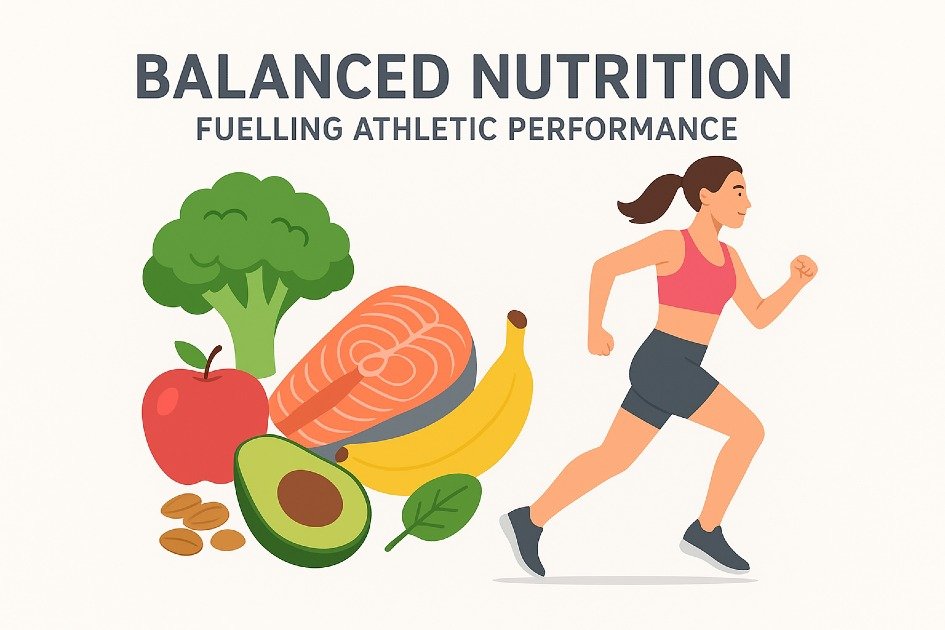
Nutrition and Physical Performance
Your diet significantly affects your physical performance during activities like weightlifting and running. Adequate nutrition helps fuel muscles, improve focus, and enhance recovery, making workouts more effective.
Fuel Your Body Right for Better Workouts
Why it matters:
Eating before exercise enhances energy, endurance, and focus, while inadequate fueling can lead to sluggish workouts and stagnating performance.
How to do it:
- Eat a balanced snack about one hour before your workout.
- Choose complex carbs such as oatmeal, whole-grain toast, or a banana to keep your energy steady all day.
- Add a small protein source like Greek yogurt or whey protein to keep your muscles strong and healthy.
- Drink 12–16 ounces of water before your workout to help your body stay cool, replace sweat, and boost performance.
- Try this simple test—notice which foods make you feel energized and which cause discomfort. Everyone’s body reacts differently, so learn what works best for you.
Sarah noticed she ran faster and felt less tired when she ate a small banana with almond butter before her morning jog.
Post-Workout Nutrition Builds Faster Recovery
Why it matters:
Post-workout nutrition is crucial for accelerating recovery, repairing muscle tissue, and replenishing glycogen stores, making it as important as pre-workout fuel.
How to do it:
- Eat 20–30 grams of protein within an hour after your workout, such as a shake, chicken breast, or tofu, to help your muscles recover and grow.
- Eat complex carbs like sweet potatoes, quinoa, or brown rice to refill your body’s energy and keep you strong.
- Add electrolytes by drinking coconut water or a little salt in water when you sweat a lot.
- Pair protein and carbs in a 1-to-2 ratio to help your body recover faster and stay strong.
- Stay consistent by making your post-workout meal a daily habit that fuels recovery and builds lasting strength.
Mark, a weightlifter, felt less sore after workouts when he began mixing a whey protein shake with oatmeal right after training.
Hydration and Its Role in Peak Performance
Why it matters:
Water acts as a performance enhancer by ensuring optimal function of muscles, joints, and organs through proper hydration.
How to do it:
- Drink 8 to 10 glasses of water each day to keep your body strong and your mind clear.
- Drink 12–16 ounces of water about 30 to 60 minutes before your workout to stay energized and prevent dehydration.
- Drink 5 to 10 ounces of water every 15 to 20 minutes while exercising, especially when your workout is intense.
- Refuel after exercise by drinking water or an electrolyte beverage to restore fluids and boost recovery.
- Dark urine and dry mouth warn your body is dehydrated.
Emma, a cyclist, noticed that drinking water regularly before and during rides boosted her stamina and sharpened her focus.
When Supplements Truly Help
Why it matters:
Whole foods are essential for performance, but certain supplements can improve outcomes when used properly.
How to do it:
- Protein powder helps you reach your daily protein goals.
- Creatine boosts strength and power, helping you perform better in high-intensity workouts.
- BCAAs help your muscles recover faster during long workouts.
- Omega-3 fatty acids help ease inflammation and joint pain.
- Talk to a healthcare professional before taking any supplements.
How to Integrate Nutrition for Physical Performance
Why it matters:
Consistency in nutrition can be attained through small, sustainable adjustments rather than drastic lifestyle changes, leading to a lasting impact.
How to do it:
- Prepare your meals before and after workouts
- Keep healthy snacks like fruits, nuts, and yogurt within reach to boost energy quickly.
- Track your meals and see how they affect your energy.
- Pay attention to your body and change your routine based on hunger, tiredness, and how well you perform.
Liam, a busy professional, prepared his snacks the night before workouts. Ready-to-eat fruit and protein bars boosted his energy and helped him stay consistent at the gym.
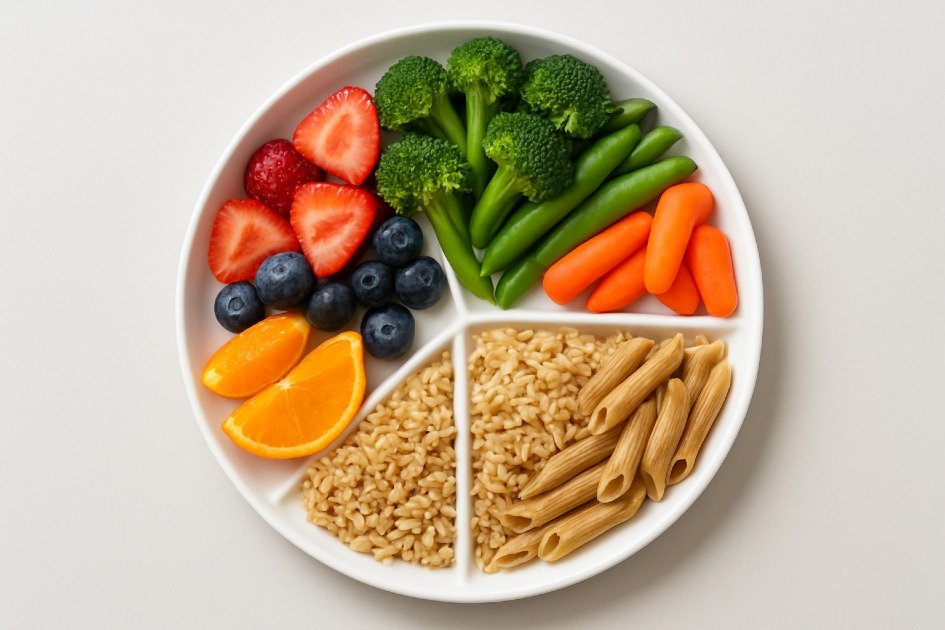
Healthy Eating Habits for Long-Term Success
Building healthy eating habits can be straightforward and enjoyable through small, consistent choices that yield significant long-term results.
Mindful Eating That Helps You Hear Your Body
Why it matters:
Mindful eating encourages individuals to pay attention to their body’s signals, as many tend to eat unconsciously, which can result in overeating and digestive issues.
How to do it:
- Stop before you eat and ask yourself if you are hungry or just bored.
- Take smaller bites and enjoy each flavor so your brain can feel full in time.
- Pause and set your fork down between bites to enjoy your food fully.
- Enjoy meals together at the table and keep phones and screens away.
Sarah, a busy mom, often ate her kids’ leftovers without noticing. When she started eating mindfully, she cut out extra snacks and gained control over her nutrition.
Breaking Bad Habits Without Feeling Restricted
Why it matters:
Strict diets frequently fail due to feelings of deprivation. Gradually upgrading habits is more effective than complete elimination of enjoyable foods, as balanced nutrition relies on flexibility rather than extremes.
How to do it:
- Try sparkling water with fresh fruit instead of sugary drinks.
- Swap fried foods for baked or air-fried options to eat healthier and cut extra fat.
- Swap one processed snack for a healthier option each day instead of stopping all at once.
- Place fresh fruit or nuts where you can see and grab them easily.
John loved soda but started drinking sparkling water three times a week. Gradually, he cut back on soda without feeling strong cravings.
Making Healthy Eating Fun and Sustainable
Why it matters:
Long-term nutrition success hinges on enjoyment; if food feels punishing, abandonment is likely. Incorporating fun is essential for sustained motivation.
How to do it:
- Try a new healthy recipe from around the world each week to keep meals exciting and nutritious.
- Cook with your family to make meals fun and bring everyone together.
- Include a mix of colorful vegetables on your plate to boost nutrition and make meals more appealing.
- Enjoy small treats now and then to prevent thinking in extremes.
I helped a family start “Taco Tuesdays” with whole-grain tortillas, beans, and fresh toppings. They loved it, looked forward to it each week, and boosted their nutrition without missing flavor.
Portion Control Without Guilt
Why it matters:
Learning moderation in portion sizes is essential, even for healthy foods, to prevent weight gain while maintaining balanced nutrition and enjoyment of favorite foods.
How to do it:
- Serve food on smaller plates to naturally eat less.
- Eat vegetables to cover half your plate before adding proteins and carbs.
- Stop midway through eating and check if you feel full before continuing.
- Store leftovers right away to prevent going back for more.
Lisa used to eat until she felt stuffed. When she switched to a smaller plate, she felt full of less food and had more energy every day.
Consistency Over Perfection
Why it matters:
Real success in nutrition is achieved through steady habits, where one healthy choice each day has a greater impact than temporary diets.
How to do it:
- Focus on eating mostly nutrient-rich foods while keeping some room for treats, aiming for an 80/20 balance.
- Forgive mistakes fast and move on so one bad meal does not ruin your week.
- Recognize your small wins by drinking more water and cooking meals at home.
- Track your meals daily to notice healthy and unhealthy eating patterns.
Strategies for Everyday Success
Why it matters:
Healthy nutrition should be integrated into daily routines, and having effective strategies can help maintain adherence even on hectic days.
How to do it:
- Stick to the grocery store edges to find fresh fruits, vegetables, and wholesome foods.
- Make veggie sticks and hummus ahead for quick, healthy snacks.
- Carry a reusable water bottle to remind yourself to drink water throughout the day.
- Save easy recipes or try meal kits to make quick, healthy meals.
Mia, a college student, made overnight oats for quick mornings. This simple habit let her avoid vending machine snacks and boost her daily nutrition.

The Role of Lifestyle Factors in Nutrition
Balanced nutrition is influenced by various lifestyle factors beyond just food intake. Sleep, stress, exercise, and hydration significantly affect how the body utilizes nutrients.
Sleep Fuels Better Nutrition Choices
Why it matters:
When sleep is inadequate, the body increases the production of hunger hormones (ghrelin) and decreases the hormone that indicates fullness (leptin), leading to cravings for high-calorie, sugary foods.
How to do it:
- Stick to a consistent sleep routine by going to bed and waking up at the same time every day, including weekends.
- Avoid screens before bed because blue light lowers melatonin and disrupts sleep.
- Build a calming routine by stretching gently, reading a book, or listening to soothing music.
- Keep your room cool and dark so your body can rest deeply and sleep better.
Sarah often snacked at night after sleeping for just five hours. When she started getting seven hours of sleep, her cravings dropped, and she stuck to her nutrition plan more easily.
How Stress Changes the Way You Eat
Why it matters:
Chronic stress elevates cortisol levels, contributing to increased belly fat and eating emotional. It typically prompts individuals to choose quick comfort foods over nutrient-dense options, resulting in unbalanced nutrition.
How to do it:
- Take five minutes to breathe deeply and lower cortisol while easing cravings.
- Take short breaks by walking outside or stretching to curb stress snacking.
- Practice mindfulness by focusing on each bite to recognize when you feel full.
- Set aside time for rest and add relaxing activities to your calendar.
I used stress management techniques, which helped me eat less when stressed and choose healthier foods.
Hydration Fuels Your Body’s Nutrition
Why it matters:
Dehydration can mimic hunger, causing unnecessary eating when fluids are needed. Adequate water intake supports nutrient absorption, temperature regulation, and toxin elimination, making hydration essential for effective nutrition.
How to do it:
- Drink water first thing in the morning to restore the fluids your body lost overnight.
- Keep a reusable water bottle with you to stay hydrated all day.
- Infuse your water with fresh lemon, cucumber, or mint to make drinking it refreshing and tasty.
- Check your urine color and keep it light yellow to stay properly hydrated.
I drink a glass of water before meals to feel fuller and manage my portions, keeping my nutrition goals on track.
Fuel Your Body with Active Movement
Why it matters:
Exercise enhances nutrient utilization, supports muscle growth, and helps regulate blood sugar levels. It is essential for maximizing health potential alongside proper nutrition.
How to do it:
- Eat a balanced snack with protein and carbs to power your workout.
- Refuel with protein within an hour after exercise to help your muscles repair and grow stronger.
- Walk 30 minutes every day to help keep your nutrition balanced and your body healthy.
- Vary your workouts with strength, cardio, and stretching to fuel your body with the nutrients it needs.
Mark, 52, began walking 20 minutes after dinner to boost his heart health. The daily habit lowered his blood pressure and helped him follow a balanced nutrition plan more easily.
Stay Consistent for Lasting Lifestyle Success
Why it matters:
Nutrition is most effective with consistency; skipping meals or extreme dieting can lead to frustration. Establishing steady habits creates a solid foundation for successful nutrition.
How to do it:
- Prepare your meals and snacks in advance to avoid making unhealthy choices at the last minute.
- Aim for steady progress and keep your goals realistic, not perfect.
- Celebrate every healthy choice and keep building momentum.
- Build a support network by telling friends your goals or joining a group that shares your interests.
I started by swapping just one soda for water each day. That slight change gave me momentum, and over time, my eating habits improved and my energy soared.
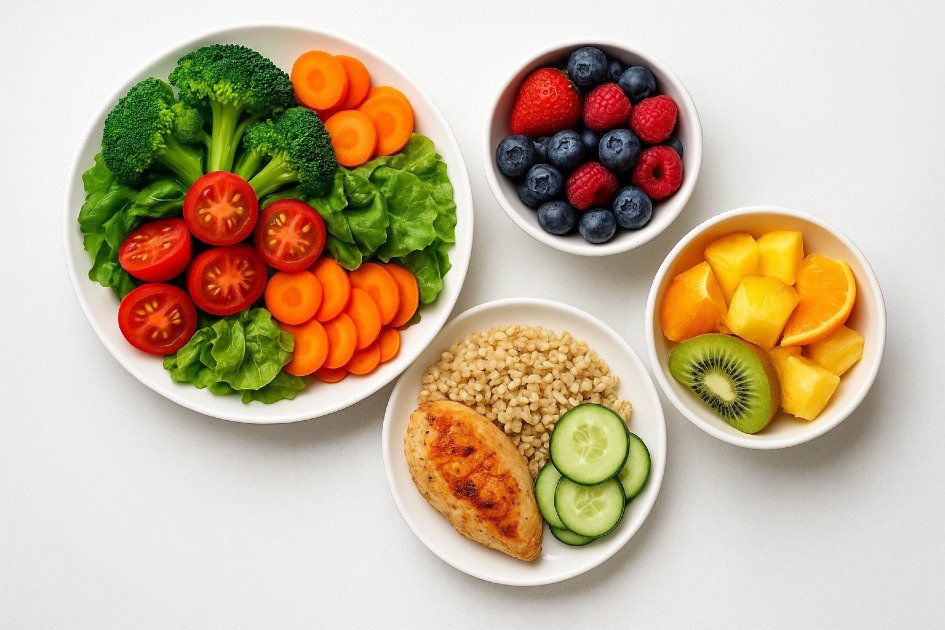
Steps for Everyday Balanced Nutrition
Balanced nutrition is manageable by making small, realistic daily choices that lead to meaningful results over time.
Emphasizing simple, sustainable habits helps improve well-being and fosters a lifestyle that is maintainable.
Shop Wisely to Boost Your Nutrition
Why it matters:
Stocking your kitchen with nourishing options increases the likelihood of making healthier choices throughout the week, while poor nutrition often stems from impulse purchases that undermine long-term goals.
How to do it:
- Stick to the store’s edges where fresh fruits, vegetables, lean meats, and dairy sit. The middle aisles usually hold highly processed foods.
- Plan your shopping and follow your list to skip sugary snacks and salty treats.
- Pick whole fruit instead of fruit juice and choose plain oats over flavored instant packets for better nutrition.
- Check labels carefully and choose foods with less added sugar, sodium, and preservatives.
I started swapping flavored yogurts for plain Greek yogurt and adding my own berries. I cut hidden sugars and saved money every month.
Reading Labels Without Confusion
Why it matters:
Understanding product labels is essential to avoid being misled by items marketed as “healthy,” enabling better control over nutrition.
How to do it:
- Check the ingredient list and choose products with fewer items to avoid extra additives.
- Watch your portions as snacks can seem healthy but quickly add up if servings are small.
- Pay attention to fiber, protein, and add sugar instead of just counting calories.
- Skip trendy labels such as “natural” or “low-fat” since they do not always mean the food is healthier.
I once bought “low-fat” peanut butter thinking it was healthier, but the label showed added sugar. I switched to natural peanut butter and got better nutrition with fewer hidden calories.
Dining Out Without Derailing Your Nutrition
Why it matters:
Eating out can disrupt balanced nutrition if intentional choices are not made, as restaurant meals often contain hidden fats, sugars, and oversized portions.
How to do it:
- Check the menu ahead of time since many restaurants share nutrition details online.
- Request grilled instead of fried and ask for dressing on the side.
- Share a large dish with a friend to enjoy the meal without overeating.
- Focus on vegetables by including a side salad or extra greens with your meals.
I used to eat burgers when I rushed. Now, I choose grilled chicken, extra veggies, and water. I feel more energized the next morning.
Quick and Nutritious Snack Ideas
Why it matters:
Snacking can be beneficial when choosing smart snacks that stabilize energy, support fitness goals, and prevent overeating at main meals.
How to do it:
- Try apple slices with almond butter or dip carrots in hummus for a protein and fiber boost.
- Measure nuts, seeds, or boiled eggs into small containers for easy grab-and-go snacks.
- Serve snacks on a plate and eat mindfully instead of munching straight from the bag.
- Drink water before eating since thirst can mimic hunger.
I used to grab a candy bar at 3 p.m. at work. Now I am reaching for mixed nuts and water. I skip the sugar crash and stay focused all afternoon.
Creating a Kitchen That Supports Balanced Nutrition
Why it matters:
Your environment shapes your habits, and having convenient, nutritious foods easily accessible can lead to better nutritional choices.
How to do it:
- Place fresh fruit in a bowl on the counter to make healthy snacking easy and tempting.
- Keep your kitchen stocked with whole foods like brown rice, beans, frozen vegetables, and lean proteins to make healthy meals fast on busy nights.
- Place healthy foods at eye level in your fridge and pantry to make better choices easy.
- Keep unhealthy snacks out of your home so that you will not be tempted to eat them.
I replaced soda in my fridge with sparkling water and lime. Guests enjoy a refreshing drink, and I cut extra sugar from my diet.
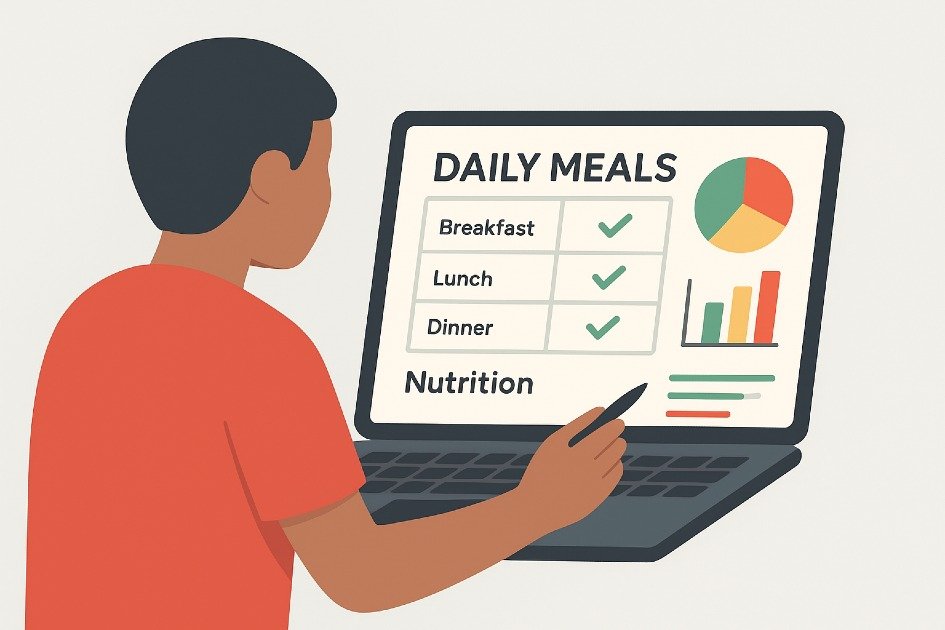
Monitoring and Adjusting Your Nutrition Plan
Sticking to a nutrition plan focuses on progress rather than perfection, as our bodies and needs evolve. Monitoring and adjusting your nutrition are essential for maintaining health, strength, and energy over time.
Track Progress Without Obsessing Over Numbers
Why this matters:
Numbers should be used as a guide rather than a controlling factor, as obsessively counting calories can create stress rather than promote balance.
How to do it:
- Track your meals in a journal and write how each one makes you feel afterward.
- Focus on your energy, not just the scale.
- Track your progress with a photo each month rather than checking the scale every day.
- Use simple apps like MyFitnessPal to track meals and exercise without getting obsessed.
Spot When Your Nutrition Plan Is Not Working
Why this matters:
Your body provides constant feedback and recognizing it can help you know when to adjust your plan.
How to do it:
- Frequent energy crashes often mean you are eating too many processed carbs.
- Watching your sleep—trouble resting may signal your body needs more magnesium or protein.
- Pay attention to digestion; bloating or discomfort may signal low fiber intake or food sensitivities.
- See a dietitian if problems continue for several weeks.
Take Small Steps to Improve Daily
Why this matters:
Making drastic changes to your nutrition plan can be daunting; gradual adjustments are more sustainable than abrupt transformations.
How to do it:
- Replace a sugary drink each day with water or herbal tea to stay healthier and boost energy.
- Include an extra serving of vegetables with your dinner to boost nutrition and support overall health.
- Swap refined snacks for nuts, seeds, or fresh fruit for a healthier boost.
- Ease into smaller portions instead of cutting out entire food groups.
Track Your Nutrition Easily with Smart Tools
Why this matters:
Technology can enhance nutrition management if used wisely, providing useful information without consuming excessive time.
How to do it:
- Try apps that read food labels to show nutrients fast.
- Use smart water bottles that monitor your hydration for you.
- Track your workouts and meals using fitness devices to see how exercise and nutrition work together.
- Try meal-planning apps to speed up grocery shopping and make healthier choices.
Adapt Quickly Using Real Feedback
Why this matters:
Reflecting on the impact of nutrition on daily routine is crucial, as significant insights often stem from real-life experiences rather than just applications.
How to do it:
- Pay attention to meals that keep you full longer.
- Write down how you feel after each meal.
- Join support groups or online forums to share your story and learn latest ideas from others’ experiences.
- Review your plan each month so you stay on track and avoid burnout.
I had a client who swapped her late-night ice cream for Greek yogurt with berries. After a month, she slept better, woke up with steady energy, and her skin looked clearer.
Recap: Healthy Habits Now, Strong Body Later
Every significant transformation starts with small steps, emphasizing that balanced nutrition focuses on consistency and gradual improvements rather than strict restrictions.
Balanced nutrition fits your lifestyle and promotes mindful eating. Choosing colorful whole foods, avoiding processed items, and drinking more water can improve your health over time.
Harvard Health advocates for a healthy diet, focusing on natural, unprocessed foods like fruits, vegetables, legumes, whole grains, nuts, seeds, and limiting saturated fats, sugars, and sodium.
Nutrition prioritizes progress over perfection, presenting daily opportunities to nourish the body which contributes not only to physical health but also to mental clarity and resilience.
The journey to better nutrition is not meant to be daunting; it begins with small, steady changes that can lead to lasting benefits.
Frequently Asked Questions
What does “balanced nutrition” really mean?
Balanced nutrition involves intentionally consuming foods that provide essential macronutrients such as proteins, carbohydrates, and healthy fats, and crucial micronutrients like vitamins and minerals.
It focuses on nutrient density rather than just calorie count. A balanced meal typically contains lean proteins, complex carbohydrates, and colorful vegetables. Tools like meal planners can assist in tracking daily nutritional intake.
How can I tell if my diet lacks balance?
You may notice signs like fatigue, cravings, brittle nails, or dull skin, indicating a nutritional imbalance due to insufficient micronutrients.
Monitoring your food habits with a nutrition tracker app can help analyze macronutrient ratios and alert you to missing key vitamins or minerals.
Do I need supplements for balanced nutrition?
Supplements can be beneficial but should not replace whole foods. A daily multivitamin can address minor deficiencies, but the emphasis should be on real foods.
Relying too heavily on supplements may cause nutrient imbalances or toxicity. It is advisable to consult a certified dietitian before adding new supplements.
How does balanced nutrition affect energy and mood?
Your nutrition directly affects your daily feelings and functioning. Carbohydrates fuel the brain, proteins aid tissue repair, and fats help stabilize hormones.
Skipping meals or consuming excessive processed foods can lead to energy crashes and decreased focus. Balanced nutrition maintains steady blood sugar levels, enhancing energy and mood stability throughout the day.
Can balanced nutrition help with weight management?
Yes, balanced nutrition can help with weight management. When nutrition is balanced, metabolism operates efficiently, aiding in effective calorie burning.
Nutrient-dense meals promote satiety and reduce emotional eating. A personalized meal plan based on age, goals, and activity level can significantly assist in weight management.
Is plant-based nutrition enough for complete health?
A plant-based diet can provide complete nutrition if well-planned, emphasizing variety through a combination of legumes, nuts, seeds, whole grains, and vegetables to fulfill protein and vitamin requirements.
Vegans might require fortified foods or supplements for nutrients such as vitamin B12 and omega-3s, with plant-based protein powder assisting in meeting daily protein needs.
How important is hydration in balanced nutrition?
Hydration is essential for proper nutrition, aiding digestion, transporting nutrients, and eliminating toxins. Dehydration may be mistaken for hunger, potentially causing overeating.
It is advised to drink at least eight glasses of water daily, and utilizing a smart water bottle can help track intake and provide reminders.
Can balanced nutrition improve long-term health?
Consistent, balanced nutrition enhances immunity, reduces inflammation, and decreases the risk of chronic diseases such as diabetes, obesity, and heart disorders.
Small daily dietary adjustments, such as incorporating leafy greens or minimizing processed sugar, can significantly improve long-term health over time.
How can I maintain balanced nutrition with a busy lifestyle?
Planning is essential for maintaining healthy eating habits. Preparing meals in advance, having nutritious snacks available, and utilizing simple recipes can help align dietary goals.
Many busy individuals opt for meal prep kits that provide pre-measured ingredients, making it easier to prepare meals quickly and resist fast food temptations.

